Golden retrievers trace their roots to the Highlands of Scotland in the late 1800s. Dudley Marjoribanks, later known as Lord Tweedmouth, bred a yellow wavy-coated retriever with a tweed water spaniel, a now-extinct breed. Marjoribanks wanted to create a retriever perfect for the Scottish climate. The breed continued to evolve, gaining official recognition in the United States and Canada in the early 1900s. But how do they compare to hunting dogs today? Keep reading to learn more about training golden retrievers as hunting dogs, including their pros and limitations.
Do Golden Retrievers Make Good Hunting Dogs?
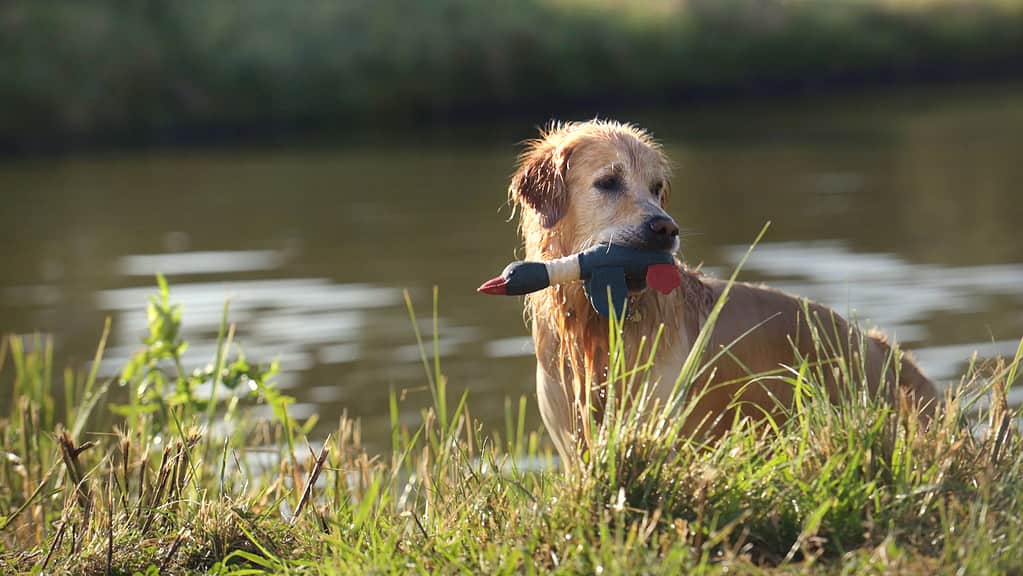
Field-bred golden retrievers are bred to hunt waterfowl and other birds.
©Zheka-Boss/iStock via Getty Images
Similar to the Labrador retriever, golden retrievers have a long sporting history. Their ancestors were versatile and easy to train, making them a popular choice for sportsmen in the 19th century. The breed’s size and natural love of water are why golden retrievers remain a top pick for hunting birds and waterfowl.
Field-bred golden retrievers are bred to hunt. They’re the same breed as show-bred golden retrievers but tend to have smaller and more agile bodies so they can run and swim while hunting. Field-bred goldens aren’t the only ones who can hunt, but they are the best choice if you’re planning on training golden retrievers as hunting dogs.
Pros of Training Golden Retrievers as Hunting Dogs
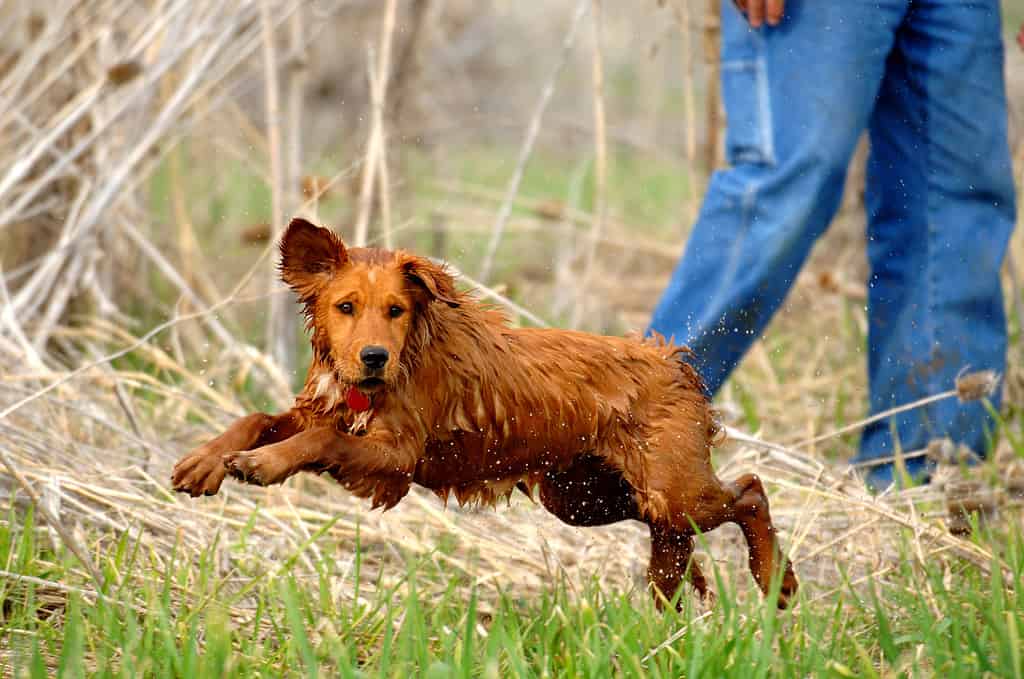
Golden retrievers are great hunters because of their instincts and trainability.
©Brent Paull/iStock via Getty Images
1. Easy to Train
Golden retrievers have instincts that make them great hunters. They are one of the most adaptable sporting breeds, quickly learning how to complete various tasks. Golden retrievers are enthusiastic and eager to please their owner. Their innate loyalty makes it easy to teach them new commands, even as they age. However, they require formal training to hone their skills.
Consistency and patience are still required to reach your training goals. If you’re training golden retrievers as hunting dogs, you will need one to two years of training. A significant portion of field training includes listening to the handler while shots are fired and then waiting until the command is given to retrieve the game.
2. Retrieval Instinct
Living up to their name, golden retrievers are natural retrievers. They are good listeners, so they follow directions and have excellent recall. Their high energy also keeps them engaged while working. Their athletic build and innate retrieval instincts help them retrieve game from the water and difficult terrain.
Don’t forget their low prey drive. You won’t have to worry about your golden following their nose and running off against your command. Of course, they require training to perfect their bird retrieving on real hunts.
3. High Intelligence
Golden retrievers are suitable for a wide range of jobs because of their intelligence and excellence in obedience training. In addition to working as hunting dogs, golden retrievers are also commonly trained as assistance and guide dogs. They’re fast problem solvers and are in tune with human emotions. As a result, they can remain focused despite distractions.
They can also learn a new command after about five repetitions. Most dogs require 15 to 40 repetitions, which means golden retrievers can learn new tricks about five times faster than the average dog. The breed’s intelligence combined with training makes them the perfect companion.
4. Athletic
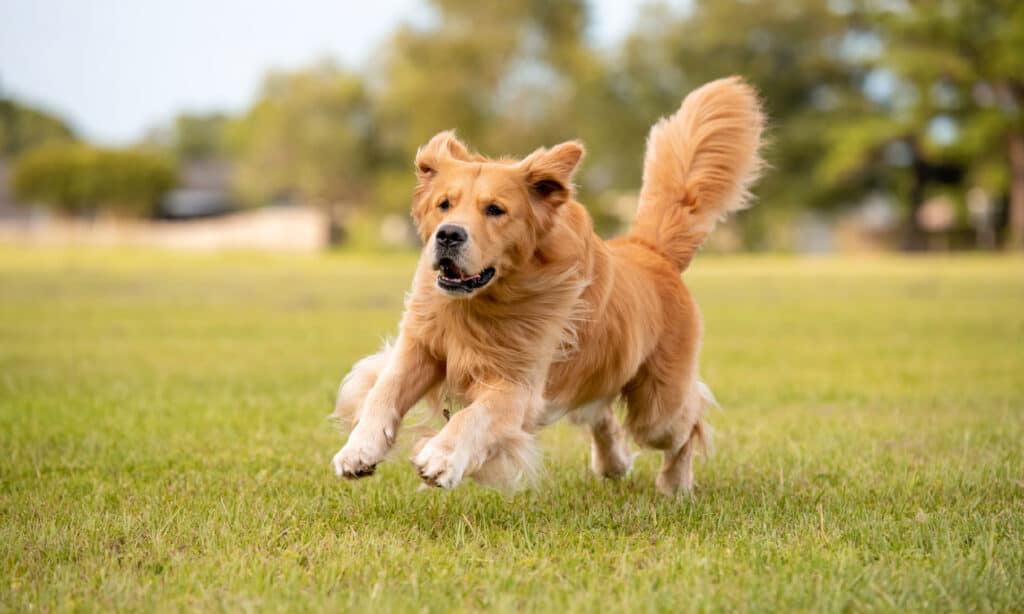
Field-bred golden retrievers have more compact and athletic bodies than other golden types.
©iStock.com/Tatyana Consaul
Field goldens are specifically bred to be athletic. Their bodies are shorter and more compact than other golden types. One of the most notable features is their short, dense coat. Their undercoat keeps them warm when it’s cold, while their topcoat is water-resistant. The multi-layered coats of golden retrievers make them versatile in the field by allowing them to run and swim easily.
Show-bred goldens have the signature long and flat coat that makes them look as soft as a cloud. However, this luxurious coat isn’t ideal for cold and wet outdoor conditions. That’s why field-bred goldens are the ideal choice if you plan on training golden retrievers as hunting dogs.
5. Love of the Water
In addition to their athletic build, most golden retrievers love to swim. Golden retrievers are genetically great swimmers. They have the strength and stamina to quickly swim long distances to retrieve waterfowl. Hunters shoot down game into lakes and other bodies of water for their goldens to collect. Their water-repellent coats make this task easier by keeping their body at a healthy temperature. Golden retrievers also have webbed feet, acting more like flippers to help them easily tread water.
6. Incredible Sense of Smell
Nothing compares to the nose of a bloodhound, but golden retrievers still have an incredible sense of smell. In fact, they use their sense of smell to find people long after their scent has nearly disappeared or warn their owners of food allergens. They can use their nose to detect smells in the air and not just on the ground. This ability helps them find animals in the distance and in the water during a hunt.
Limitations of Training Golden Retrievers as Hunting Dogs
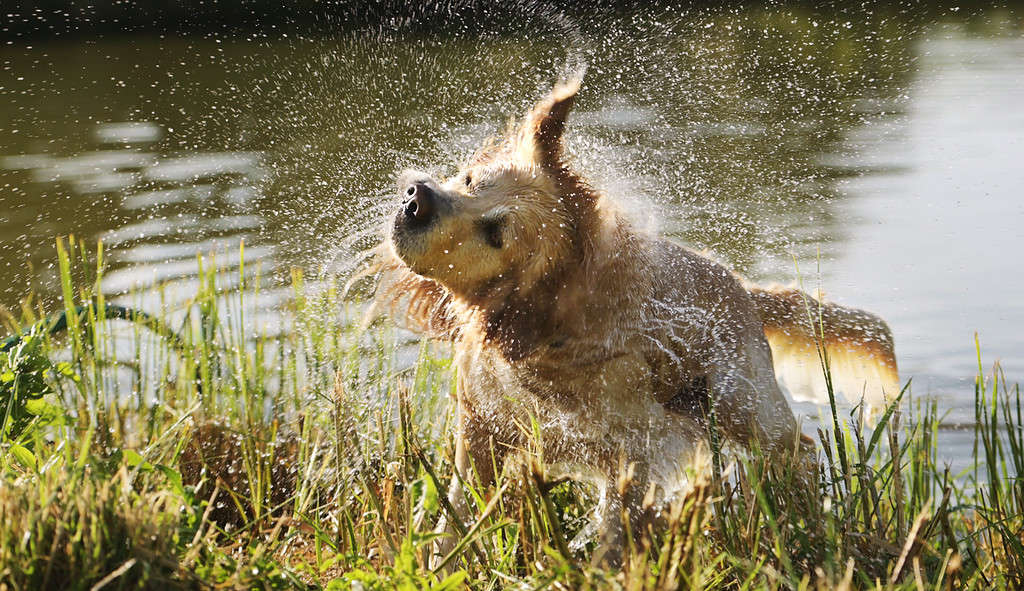
Golden retrievers are prone to skin allergies, so they require frequent grooming.
©Zheka-Boss/iStock via Getty Images
7. Field-Bred Golden Retrievers Are Challenging to Find
Golden retriever puppies are commonly in high demand. In fact, they’re one of the most popular breeds in the United States. Finding a puppy from a reputable breeder can be challenging. If you want a particular color, size, and gender, on top of wanting a field-bred golden, you might have to do a lot of research to find one. Waitlists are often filled out months in advance and puppies can cost between $800 to over $2,000 depending on lineage and licensing.
Once you find a reputable breeder, they can help you select the right puppy. They spend around eight to 12 weeks caring for the puppies, so they have a good feel for their personalities. Your breeder will ask questions regarding your lifestyle and plans for the puppy. You should also ask questions about their lineage to familiarize yourself with your puppy’s background and health history. Once you’re ready to get your puppy, there’s a good chance you’ll have to travel to another state to pick it up.
8. Long List of Health Problems
Every dog breed is prone to specific health problems. However, golden retrievers are genetically predisposed to numerous illnesses. Skin allergies, elbow and hip dysplasia, heart disease, pigmentary uveitis, and cancer are just a few of the most common health conditions.
A predisposition for these illnesses doesn’t guarantee that your golden will have them. In fact, a healthy diet, adequate daily exercise, and routine vet visits can reduce some of the risks.
If you’re training golden retrievers as hunting dogs, it’s in your best interest to keep them as healthy as possible so they can successfully hunt. Talk to your breeder about their family history, and watch out for signs of common health problems as your golden ages to help them live a long and healthy life.
9. Require Frequent Grooming
One major drawback to using golden retrievers as hunting dogs is the need for frequent grooming. They are large dogs with long coats. Therefore, they get dirty easily. Although field-bred goldens have shorter, denser coats than show-bred goldens, burrs and tangles are still a problem. These can knot their fur, requiring more attention than simply brushing them out. Regular, attentive grooming is crucial since they are predisposed to skin allergies. Seasonal and plant allergies are a major concern for dogs working in the field.
10. Best Suited for Hunting Birds and Waterfowl
Due to their build, goldens are ideal for hunting waterfowl, pheasant, and upland game. But most avid hunters don’t consider golden retrievers “specialists.” Instead, they can hunt doves, ducks, geese, and other types of birds.
However, the golden retriever may not be your first choice if you’re interested in hunting something other than birds. For instance, fox hunters may have better luck with the American foxhound or bluetick coonhounds for larger animals. If you’re interested in golden retrievers as hunting dogs, ensure your hunting goals align with their abilities.
Bottom Line in Training Golden Retrievers as Hunting Dogs
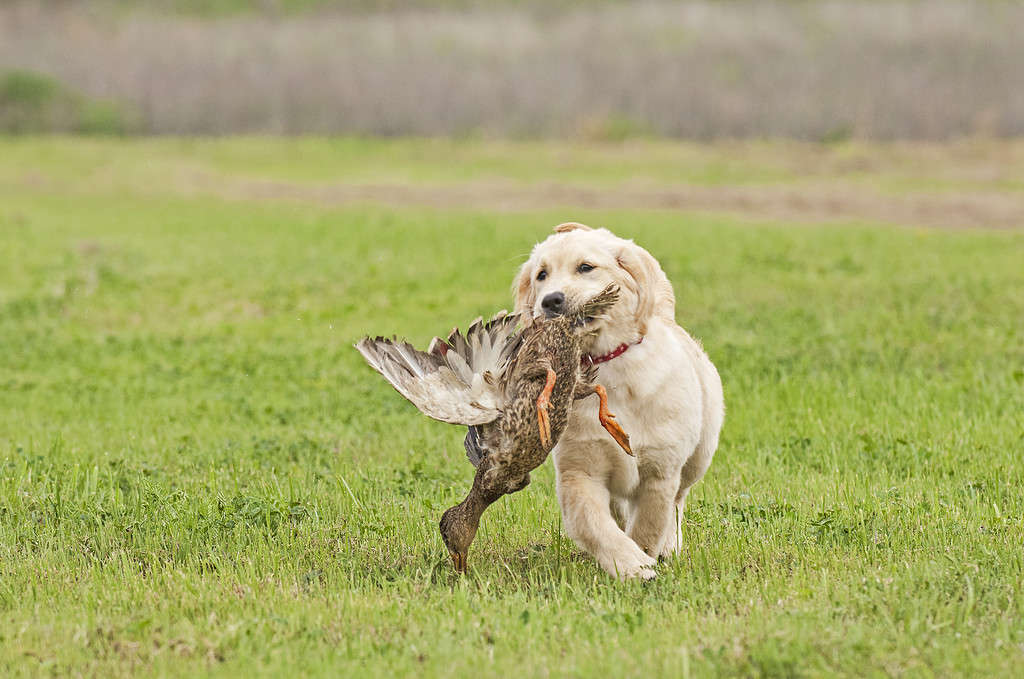
Golden retrievers are great family pets and a top choice for bird hunting.
©stuckreed/iStock via Getty Images
If you’re interested in training golden retrievers as hunting dogs, it’s important to understand their history and begin with basic obedience training. Your golden will need to learn simple commands to create a foundation for learning more complex commands you plan to use in the field.
After mastering basic obedience, they can start training to hunt. Some of the first skills include tracking scents, retrieving, swimming, and potentially working with a pack. Luckily, these skills come naturally to the breed, putting you a step ahead. If you’re new to hunting or training, you can get help from a professional so you and your golden will start on the same page.
Golden retrievers are also kind and patient, two traits that help them to double as lovable family pets. Therefore, you will have a loyal companion in the house and on the field. Despite some of their limitations, golden retrievers make excellent hunting dogs.
The photo featured at the top of this post is © tglco/iStock via Getty Images
Ready to discover the top 10 cutest dog breeds in the entire world?
How about the fastest dogs, the largest dogs and those that are -- quite frankly -- just the kindest dogs on the planet? Each day, AZ Animals sends out lists just like this to our thousands of email subscribers. And the best part? It's FREE. Join today by entering your email below.
Thank you for reading! Have some feedback for us? Contact the AZ Animals editorial team.






